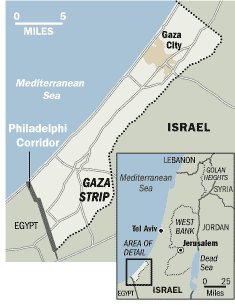![]()
Sat, July 09, 2011 | By Rob Harris
Legal issues and the Flotilla: Further points in the argument over the blockade
This is the second of a two part article on legal issues concerning the Gaza Flotilla.
The legality and morality of Israel’s blockade has been questioned extensively and is the supposed subject of sustained and extensive protest, most recently with the outrageous “flytillas” after Greece hampered pro-Palestinian flotilla efforts to break the blockade on Gaza. Further to the article “Can Greece legitimately prevent the flotilla sailing to Gaza?”, here are some observations on several questions that tend to surround the entire debate: whether or not Israel has a legal right of access to Gaza’s adjacent waters, whether or not Gaza is in fact occupied by Israel, and the notion that Gaza is not in fact an actual state is also queried.
It should be noted that while the Palestinian Authority has civil power on the ground, the borders, ports, and airspace of Gaza, under the Oslo Agreements to which the Palestinian Authority voluntarily subscribed, are more complex as they affect Israel. Israel has certain controls over air space and ports. In Annex XI of Oslo I (1993), “Israel’s continuing responsibilities”, the State would continue to be responsible for external security.
This train of thought continued with the follow-up treaty called The Gaza–Jericho Agreement (1994). It states in Article 5, Section 3a:
Israel has authority over the Settlements, the Military Installation Area, Israelis, external security, internal security and public order of Settlements, the Military Installation Area and Israelis, and those agreed powers and responsibilities specified in this Agreement.
Oslo II went into more detail, affirming that Israel has the exclusive responsibility to protect against external threats from the air and sea, whilst the Palestinians were to have a force to deal with internal security. To quote Chapter 2, Article XII, section 1,
In order to guarantee public order and internal security for the Palestinians of the West Bank and the Gaza Strip, the Council shall establish a strong police force as set out in Article XIV below. Israel shall continue to carry the responsibility for defense against external threats, including the responsibility for protecting the Egyptian and Jordanian borders, and for defense against external threats from the sea and from the air, as well as the responsibility for overall security of Israelis and Settlements, for the purpose of safeguarding their internal security and public order, and will have all the powers to take the steps necessary to meet this responsibility.
Most pro-Palestinians seem to believe that Gaza is still occupied, in part because Israel is still in control of Gaza’s airspace and the adjacent sea. However, this is doubtful according to international treaties like The Hague Regulations of 1907, entitled “Respecting the Laws and Customs of War on Land”. To quote Article 42:
Territory is considered occupied when it is actually placed under the authority of the hostile army. The occupation extends only to the territory where such authority has been established and can be exercised.
Israel cannot be said to be the authority of Gaza. Neither can it exercise any authority over the territory without full-scale invasion, such as during Operation Cast Lead. Occupation requires complete control of a given area. Therefore it should be clear that Israel does not occupy the Gaza.
Below is an extract of an interview published in Die Zeit, the respected weekly German newspaper, with maritime law expert Heintschel von Heinegg, partly translated here which affirms the legitimacy of the Gaza blockade at several levels:
ZEIT ONLINE: Now a second and far larger international convoy is on its way to Gaza — a convoy that aims to break Israeli’s sea blockade of Gaza. Is this blockade even allowable from a legal standpoint?
Wolff Heintschel von Heinegg: Well that depends on how you characterize the conflict between Israel and the Palestinians. When jurists come together, they often disagree on this matter. But there’s definitely a consensus on one thing — namely that what you have here is an armed conflict. Which means that the laws governing such conflicts apply; and under these laws, sea blockades are allowed.
ZEIT ONLINE: But doesn’t the conflict also have to involve two or more states?
Wolff Heintschel von Heinegg: Right. And the problem is that Palestine is not a state — at least not yet — which is why many feel that the conflict is not an international armed conflict. And if you take that view, then blockade laws don’t apply. But if you take an objective look at the relevant legal analyses, it’s readily apparent that the basic admissibility of the Israeli blockade has never been called into question.
Some pro-Palestinians have argued that Gaza is not a state so a blockade is not legal. However, some argue that it would appear to be a form of state according to the Oslo accords. It has some level of sovereignty where it has a level of control over adjacent waters, an elected government that controls the civilian infrastructure and acts as a legislature, and the PA, of which it is a part, issues passports which some commentators assert are hallmarks of a sovereign state. Moreover neither Egypt nor Israel ever annexed Gaza. This leads to the conclusion that it is a de facto self-governing state, in part since 2005 with Israel’s withdrawal, and its level of independence intensified when Hamas expelled Fatah in 2007.
Finally, the question should be asked as to whether the risk to Israel posed by Hamas ruling in Gaza is substantial. Firstly, Hamas have affirmed that they intend to continue conflict with Israel. Secondly, large amounts of weaponry have been discovered en route to Hamas on numerous occasions in the past. Most recently fifty tons of weapons, including medium range missiles, were seized aboard the ship German registered ship “Victoria” in March, and numerous attempts to smuggle armaments have been made by Iran, a nation that is explicitly committed to Israel’s destruction. Their increasing presence in the Red Sea is a new source of worry for both naval conflict and smuggling into Gaza. They have dispatched submarines to the area and seek to establish a military presence.
It seems reasonable to assert that Israel has a legitimate legal right to enforce a blockade. Furthermore, that right is also morally justified. The threat to Israel caused by breaking the blockade is substantial.



 RSS
RSS











Legal issues and the #Flotilla: Further points in the argument over the blockade
| #Israel #Gaza http://bit.ly/omsZ6m
Legal issues and the #Flotilla: Further points in the argument over the blockade
| #Israel #Gaza http://bit.ly/omsZ6m